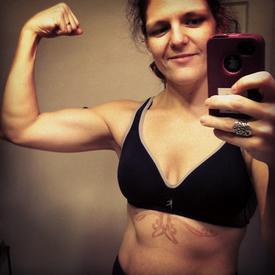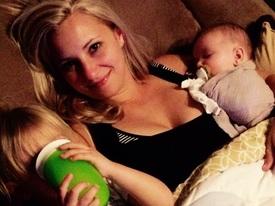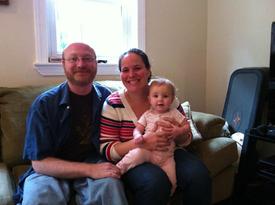eating to fuel your body (very long)
Options

SHBoss1673
Posts: 7,161 Member
I've been seeing a lot of posts recently questioning whether to eat your exercise calories. I would like to make an attempt to resolve this question with science and a better understanding of how our metabolism works.
So when members on MFP say to eat your exercise calories, we aren't doing this out of ignorance, or to sabotage anyone's efforts. There's solid science behind it.
Please note, I'm not a Doctor, nor am I a dietitian. I'm just a trainer who's gone through the weight loss ride myself (55 lbs), and have been researching and helping people for a number of years.
First let's clear something up.
If you're obese, or morbidly obese, generally you can get away with not eating all (and in some cases eating none) of your exercise calories. This is simply because the body doesn't care where it's calories come from, sure it will try to use food eaten first, but if there isn't enough,it has no problem taking it's calories from fat and even protein that we have already within our body (body fat and muscle). So the more fat our bodies have, the more surface area of fat we have, and this means we have more available fuel. so if someone's talking about eating your exercise calories, and you know that you have lots and lots of extra fat hanging around (no pun intended) then you can usually safely ignore this statement (by saying something like: "I understand the concept, and will implement it when it becomes necessary, but for now I'll just keep burning extra body fat").
With that said, I'll dig a tiny bit deeper into why we say eat your exercise calories.
So even if you have a decent amount of body fat (say a BF% of around 30 to 40%) that doesn't mean your body can get at all of it right away. At any given moment, your body can only use so much fat as fuel. So when you eat at a calorie deficit, the ideal thing to do is create a deficit that exactly equals the amount of fat your body can mobilize and convert to fuel. Obviously we can't know for sure how much that is as there's no exact formula for this, and without very detailed blood tests, you really can't know. But we can estimate, based on prior research. Essentially through years of study and research, it's been determined that the normal peson (fat not widthstanding) can burn between 0 and 1000 calories a day in stored fat. Very obese people fall outside this spectrum (on the high side) and very small people sit on the low end of the spectrum (either people with low body fat % or people with naturally small frames that have a smaller foot print and therefore less fat to mobilize at any one time).
So what happens when you have a deficit already and then exercise? Well, since you're already at a deficit (and assuming you're being reasonable and not overdoing it) when you add exercise to the picture, you add more calories burned to your total daily energy expendature (TDEE). That means in order to stay within the range that I stated before (0 - 1000), you would have to add calories to your diet. You would still stay within your deficit range if you did so. As you can see, eating exercise calories doesn't diminish how much you would lose, it just keeps the metabolism stable. We talk about eating exercise calories not to make it take longer for you, but to allow you to lose weight in such a way that you can continue for life, this is a lifestyle change, not a quick fix.
things that can derail this process.
1) You're trying to lose too much too fast. 2 lbs a week isn't for everyone, most people who are in the overweight category should never attempt more than 1 lb per week. You simply don't have the body fat stores in order to make up the difference. You'll end up making it harder.
2) You've been eating so low for so long that your body has adjusted to it. In this case, if you immediately start eating your exercise calories, you're bound to gain weight for a month or more before your body corrects itself, and allows you to again begin burning fat stores. It's better to raise your calories by about 50 or 100 a day, every week (I.E. week one add 50 to your daily calories, week 2 add another 50 ...etc.) Until you reach something close to maintenance, give it 3 or 4 weeks, then begin your deficit. I know this sounds long and torturous, but it's the ONLY way to do this right, and you'll probably notice how easy it becomes when you do this. And in the long run, is one month really that much?
3) Underestimating your food, overestimating your exercise calories, or more likely, both. I'm shocked at how few people know what a serving of food is. It's more common that people realize to make incorrect guesses about their consumption. I usually tell people to measure their food, and don't go out to eat for at least 2 to 4 weeks on a new nutrition plan, until they become more confident in what a meal SHOULD look like.
4) starvation mode. this ties in with number 2 closesly. Starvation mode is real. Eat far under your maintenance for too long and your body WILL fight back, stripping you of infrequently used muscle, slowing down organ productivity, and in some cases completely shutting down organs. This is real, it does happen and it can inhibit weight loss. PLEASE note, I didnt' say it will make you gain, it won't although if you read 2 you can see how you can gain weight while in starvation mode (but only when you up your calories drastically and quickly)
5) Eating only when you are hungry. This is a bad move for people who have abused food in the past (either by under or over eating). Your hunger response is based on hormones. When you eat too little or too much for a long period, the body can either stop sending the hormones (correctly) or send them when they aren't needed. If you aren't at a good body fat % and aren't sure your eating healthy, then don't trust hunger. It's safer to rely on a plan that you are confident in, stick to it, and allow your body to fix itself.
Obviously with regards to all of this, it refers ONLY to people who are (besides their weight) otherwise healthy. If you have metabolic conditions (I.E. diabetes, thyroid issues, metabolic syndrome...etc.) then this doesn't necessarilly hold water and you should go on the experienced advice of meical experts. And truly, I KNOW some of you have done it other ways, really I do, it's a testament to the human machine that we can do this, none-the-less it's anecdotal and really can't be used as an example of what to do, there are just to many variables to take one or two or even fifty examples and call it truth.
Hope this clears some things up
-Banks
So when members on MFP say to eat your exercise calories, we aren't doing this out of ignorance, or to sabotage anyone's efforts. There's solid science behind it.
Please note, I'm not a Doctor, nor am I a dietitian. I'm just a trainer who's gone through the weight loss ride myself (55 lbs), and have been researching and helping people for a number of years.
First let's clear something up.
If you're obese, or morbidly obese, generally you can get away with not eating all (and in some cases eating none) of your exercise calories. This is simply because the body doesn't care where it's calories come from, sure it will try to use food eaten first, but if there isn't enough,it has no problem taking it's calories from fat and even protein that we have already within our body (body fat and muscle). So the more fat our bodies have, the more surface area of fat we have, and this means we have more available fuel. so if someone's talking about eating your exercise calories, and you know that you have lots and lots of extra fat hanging around (no pun intended) then you can usually safely ignore this statement (by saying something like: "I understand the concept, and will implement it when it becomes necessary, but for now I'll just keep burning extra body fat").
With that said, I'll dig a tiny bit deeper into why we say eat your exercise calories.
So even if you have a decent amount of body fat (say a BF% of around 30 to 40%) that doesn't mean your body can get at all of it right away. At any given moment, your body can only use so much fat as fuel. So when you eat at a calorie deficit, the ideal thing to do is create a deficit that exactly equals the amount of fat your body can mobilize and convert to fuel. Obviously we can't know for sure how much that is as there's no exact formula for this, and without very detailed blood tests, you really can't know. But we can estimate, based on prior research. Essentially through years of study and research, it's been determined that the normal peson (fat not widthstanding) can burn between 0 and 1000 calories a day in stored fat. Very obese people fall outside this spectrum (on the high side) and very small people sit on the low end of the spectrum (either people with low body fat % or people with naturally small frames that have a smaller foot print and therefore less fat to mobilize at any one time).
So what happens when you have a deficit already and then exercise? Well, since you're already at a deficit (and assuming you're being reasonable and not overdoing it) when you add exercise to the picture, you add more calories burned to your total daily energy expendature (TDEE). That means in order to stay within the range that I stated before (0 - 1000), you would have to add calories to your diet. You would still stay within your deficit range if you did so. As you can see, eating exercise calories doesn't diminish how much you would lose, it just keeps the metabolism stable. We talk about eating exercise calories not to make it take longer for you, but to allow you to lose weight in such a way that you can continue for life, this is a lifestyle change, not a quick fix.
things that can derail this process.
1) You're trying to lose too much too fast. 2 lbs a week isn't for everyone, most people who are in the overweight category should never attempt more than 1 lb per week. You simply don't have the body fat stores in order to make up the difference. You'll end up making it harder.
2) You've been eating so low for so long that your body has adjusted to it. In this case, if you immediately start eating your exercise calories, you're bound to gain weight for a month or more before your body corrects itself, and allows you to again begin burning fat stores. It's better to raise your calories by about 50 or 100 a day, every week (I.E. week one add 50 to your daily calories, week 2 add another 50 ...etc.) Until you reach something close to maintenance, give it 3 or 4 weeks, then begin your deficit. I know this sounds long and torturous, but it's the ONLY way to do this right, and you'll probably notice how easy it becomes when you do this. And in the long run, is one month really that much?
3) Underestimating your food, overestimating your exercise calories, or more likely, both. I'm shocked at how few people know what a serving of food is. It's more common that people realize to make incorrect guesses about their consumption. I usually tell people to measure their food, and don't go out to eat for at least 2 to 4 weeks on a new nutrition plan, until they become more confident in what a meal SHOULD look like.
4) starvation mode. this ties in with number 2 closesly. Starvation mode is real. Eat far under your maintenance for too long and your body WILL fight back, stripping you of infrequently used muscle, slowing down organ productivity, and in some cases completely shutting down organs. This is real, it does happen and it can inhibit weight loss. PLEASE note, I didnt' say it will make you gain, it won't although if you read 2 you can see how you can gain weight while in starvation mode (but only when you up your calories drastically and quickly)
5) Eating only when you are hungry. This is a bad move for people who have abused food in the past (either by under or over eating). Your hunger response is based on hormones. When you eat too little or too much for a long period, the body can either stop sending the hormones (correctly) or send them when they aren't needed. If you aren't at a good body fat % and aren't sure your eating healthy, then don't trust hunger. It's safer to rely on a plan that you are confident in, stick to it, and allow your body to fix itself.
Obviously with regards to all of this, it refers ONLY to people who are (besides their weight) otherwise healthy. If you have metabolic conditions (I.E. diabetes, thyroid issues, metabolic syndrome...etc.) then this doesn't necessarilly hold water and you should go on the experienced advice of meical experts. And truly, I KNOW some of you have done it other ways, really I do, it's a testament to the human machine that we can do this, none-the-less it's anecdotal and really can't be used as an example of what to do, there are just to many variables to take one or two or even fifty examples and call it truth.
Hope this clears some things up
-Banks
0
Replies
-
Thank you for reminding us why MFP was designed this way! :flowerforyou:0
-
Thanks Banks. I will be referring people to this post.0
-
I agree!
There is no way I could effectively train for a Half Marathon if I wasn't fueling my body properly. And I know there would be no way I could lose fat without feeding my body properly. I think people tend to forget that when they set up their initial goals, MFP automatically deducts the calories needed to meet that weight loss goal.
1 pound per week = 500 calories less PER DAY (already included in your daily calorie goal).
For example: I am set at 1450, but that is AFTER subtracting the 500 calorie/day deficit MFP sets my goals at. So, yes, I am going to eat my exercise calories because I will still be at a 500 cal/day deficit. If I exercise and burn 400 calories, I will have 1850 calories to eat in that day. And you bet that I am going to be eating GOOD foods to fill up that quota. Not crap food that will do nothing for my body.
Thanks Banks0 -
Thanks as always for your amazing posts!0
-
Bump - Very well said as usual.0
-
awesome post, as always.
Bumpity, bump, bump!!!
:bigsmile:0 -
Bump. Great info!0
-
Thank you! As another trainer, I couldn't have said it better myself!!
Food = Fuel0 -
Bump!
Banks, ever the voice of reason. 0
0 -
Excellent post! :drinker:0
-
amen!
I am guilty of not eating all of my exercise calories. Usually I get 1650 with exercise and eat 1400-1500.... thoughts?0 -
I just love your posts! :flowerforyou:0
-
Thank you! As another trainer, I couldn't have said it better myself!!
Food = Fuel
So true. I think below is my favorite portion of the original post. Most of us are here because what we'd been doing previously wasn't working very well. I have learned how much food I need to fuel my body, and with the help of the tools here on MFP, I am able to easily track my food to be sure I get it right. If I listened to my body, I would likely eat less balanced ratios and too many calories, and that's after getting to a good body fat percentage and weight. Others may eat too little if they listens to their bodies. The beauty of MFP is that we have all the science and tools we need right here at our fingertips to do the right thing, even if it doesn't always "feel" right.5) Eating only when you are hungry. This is a bad move for people who have abused food in the past (either by under or over eating). Your hunger response is based on hormones. When you eat too little or too much for a long period, the body can either stop sending the hormones (correctly) or send them when they aren't needed. If you aren't at a good body fat % and aren't sure your eating healthy, then don't trust hunger. It's safer to rely on a plan that you are confident in, stick to it, and allow your body to fix itself.0 -
bump to read later.0
-
great post... very informative!0
-
Bump to spread the knowledge.
 0
0 -
Thank you!0
-
Bump!! People need to read this!0
-
Bump. Well put as expected. Please keep at it. Your knowledge is appreciated!0
-
Awesome post, THANKS! ~bump~0
-
Well said. Now if only those who NEED to read it will actually read it... :laugh:0
-
Thanks for taking the time out to write this up and post it! I for one very much appreciate what you do for this site and am very grateful you choose to share your knowledge on here Banks!:drinker:
Some excellent info in this thread!!
Becca:flowerforyou:0 -
Here's a great thread to check out!amen!
I am guilty of not eating all of my exercise calories. Usually I get 1650 with exercise and eat 1400-1500.... thoughts? http://www.myfitnesspal.com/topics/show/108362-eating-to-fuel-your-body-very-long?page=1#posts-1494332 Taking time to read the ENTIRE post will give you just what you're looking for:drinker: 0
http://www.myfitnesspal.com/topics/show/108362-eating-to-fuel-your-body-very-long?page=1#posts-1494332 Taking time to read the ENTIRE post will give you just what you're looking for:drinker: 0 -
Great post. Should be a sticky IMO.
And thanks for putting in that info about those of us who are in the obese category [or in my case super morbidly obese].0 -
<snip>
If you're obese, or morbidly obese, generally you can get away with not eating all (and in some cases eating none) of your exercise calories. This is simply because the body doesn't care where it's calories come from, sure it will try to use food eaten first, but if there isn't enough,it has no problem taking it's calories from fat and even protein that we have already within our body (body fat and muscle). So the more fat our bodies have, the more surface area of fat we have, and this means we have more available fuel. so if someone's talking about eating your exercise calories, and you know that you have lots and lots of extra fat hanging around (no pun intended) then you can usually safely ignore this statement (by saying something like: "I understand the concept, and will implement it when it becomes necessary, but for now I'll just keep burning extra body fat").
With that said, I'll dig a tiny bit deeper into why we say eat your exercise calories.
So even if you have a decent amount of body fat (say a BF% of around 30 to 40%) that doesn't mean your body can get at all of it right away.
<snips>
Banks,
So, what's the best way to transition to eating all of your exercise calories for someone who started out in the obese/over 40% body fat range? Would I still need to gradually increase to maintenance, hold there for 3-4 weeks, then resume a reasonable deficit including eating back all exercise calories? Or can I just gradually increase to eating back all of the exercise cals without going up to maintenance first?
My info.: I'm female, 30 years old, 5'2", medium frame, started out at 205 lbs and somewhere around 40-45 % body fat (according to the body fat scale at my gym -- I am aware that this is not the most accurate assessment of body fat %). I joined MFP in December of 2009, changed my eating habits (more fruits, veges, whole grains, lean dairy, at about 1400 cals per day) and exercised about 20 minutes per day, eating back none to 1/2 my exercise calories. Got an HRM in February, started exercising longer (30-45 minutes) and was eating back about 1/2 my exercise cals. My diary is publicly viewable.
Currently I'm 170 -- down almost 40 lbs from where I started. My base calories according to MFP are 1290, I exercise 60-90 minutes a day, 7 days a week with 3 days devoted to strength, 6 days of moderate to moderate-high intensity cardio (heart rate at about 85% of max) and one "rest" day where I do an hour of yoga. I eat back 1/2 of my exercise calories and lose about a lb per week or less (I got off track through May and June, didn't gain, but didn't really lose, and I'm struggling to get back ON track. I've lost 1 lb per week for the last 2 weeks, so things seem to be normalizing). I do not know my current body fat %. If I go by BMI, I'm still in the "obese" category, but I'm getting closer to crossing the line into "overweight".
My current goal is to get down to 125-135, then reassess my situation once I'm there.
Am I on the right track, or do I have adjustments to make?0 -
Banks,
So, what's the best way to transition to eating all of your exercise calories for someone who started out in the obese/over 40% body fat range? Would I still need to gradually increase to maintenance, hold there for 3-4 weeks, then resume a reasonable deficit including eating back all exercise calories? Or can I just gradually increase to eating back all of the exercise cals without going up to maintenance first?
My info.: I'm female, 30 years old, 5'2", medium frame, started out at 205 lbs and somewhere around 40-45 % body fat (according to the body fat scale at my gym -- I am aware that this is not the most accurate assessment of body fat %). I joined MFP in December of 2009, changed my eating habits (more fruits, veges, whole grains, lean dairy, at about 1400 cals per day) and exercised about 20 minutes per day, eating back none to 1/2 my exercise calories. Got an HRM in February, started exercising longer (30-45 minutes) and was eating back about 1/2 my exercise cals. My diary is publicly viewable.
Currently I'm 170 -- down almost 40 lbs from where I started. My base calories according to MFP are 1290, I exercise 60-90 minutes a day, 7 days a week with 3 days devoted to strength, 6 days of moderate to moderate-high intensity cardio (heart rate at about 85% of max) and one "rest" day where I do an hour of yoga. I eat back 1/2 of my exercise calories and lose about a lb per week or less (I got off track through May and June, didn't gain, but didn't really lose, and I'm struggling to get back ON track. I've lost 1 lb per week for the last 2 weeks, so things seem to be normalizing). I do not know my current body fat %. If I go by BMI, I'm still in the "obese" category, but I'm getting closer to crossing the line into "overweight".
My current goal is to get down to 125-135, then reassess my situation once I'm there.
Am I on the right track, or do I have adjustments to make?
so, from what it looks like, you're kind of in a gray area. I don't know what your deficit is at (although I assume it's 2 lbs a week) you're probably right on the edge of needing to go down a little.
It's hard to tell whether you're in what most people would call "starvation mode" because you're losing at a decent clip, although not spectacular for your situation. I guess, what I would do is what you said, a little tweaking and checking. So I'd probably bump up your calories by maybe 100 or 150 and give that 3 solid weeks while maintaining all your other activities. Either that or just eat back more of your exercise calories. If that doesn't do you right, I'd try the other direction (not all at once, I'd put a middle zone for a week or two where you lower your calories about 1/2 way, then go down another 100 to 150) and see if that helps. For some of us it's just a game of tweak this, tweak that. Unfortunately, since you ARE losing it's not so easy to figure out how to speed up the process. Well, I guess that's not the right way to put it, it's not really difficult to fathom, it's just a long process. I know for me, once i dropped out of the obese range, I had to experiment for almost 2 full months where I didn't lose hardly any weight before I found the right calories and exercises to continue.
PM me if you have more detailed questions.
congrats on the 40 lbs by the way. good job!
-Banks0 -
Bump the jam, bump get the parhty started.
Now if I could get one of my 750 calorie a day buddies to read this.
Good work.0 -
thanks for sharing that info--very helpful and resourceful!0
-
Bump the jam, bump get the parhty started.
Now if I could get one of my 750 calorie a day buddies to read this.
Good work.
oh I'll bet they read it, denial AIN'T just a river in Egypt you know! 0
0 -
Bump. That was SO interesting - and much needed!! Thank you!0
This discussion has been closed.
Categories
- All Categories
- 1.4M Health, Wellness and Goals
- 396.8K Introduce Yourself
- 44.2K Getting Started
- 260.9K Health and Weight Loss
- 176.3K Food and Nutrition
- 47.6K Recipes
- 232.8K Fitness and Exercise
- 452 Sleep, Mindfulness and Overall Wellness
- 6.5K Goal: Maintaining Weight
- 8.7K Goal: Gaining Weight and Body Building
- 153.3K Motivation and Support
- 8.3K Challenges
- 1.3K Debate Club
- 96.5K Chit-Chat
- 2.6K Fun and Games
- 4.5K MyFitnessPal Information
- 16 News and Announcements
- 18 MyFitnessPal Academy
- 1.4K Feature Suggestions and Ideas
- 3.1K MyFitnessPal Tech Support Questions





















